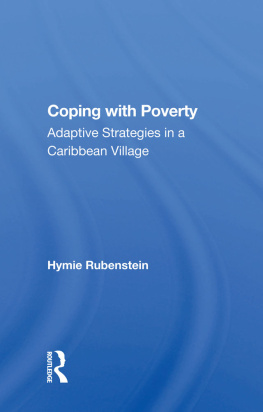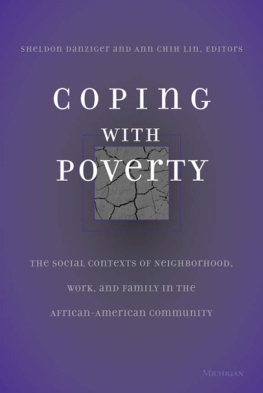Hymie Rubenstein - Coping With Poverty: Adaptive Strategies in a Caribbean Village
Here you can read online Hymie Rubenstein - Coping With Poverty: Adaptive Strategies in a Caribbean Village full text of the book (entire story) in english for free. Download pdf and epub, get meaning, cover and reviews about this ebook. year: 2019, publisher: Routledge, genre: Politics. Description of the work, (preface) as well as reviews are available. Best literature library LitArk.com created for fans of good reading and offers a wide selection of genres:
Romance novel
Science fiction
Adventure
Detective
Science
History
Home and family
Prose
Art
Politics
Computer
Non-fiction
Religion
Business
Children
Humor
Choose a favorite category and find really read worthwhile books. Enjoy immersion in the world of imagination, feel the emotions of the characters or learn something new for yourself, make an fascinating discovery.
- Book:Coping With Poverty: Adaptive Strategies in a Caribbean Village
- Author:
- Publisher:Routledge
- Genre:
- Year:2019
- Rating:5 / 5
- Favourites:Add to favourites
- Your mark:
- 100
- 1
- 2
- 3
- 4
- 5
Coping With Poverty: Adaptive Strategies in a Caribbean Village: summary, description and annotation
We offer to read an annotation, description, summary or preface (depends on what the author of the book "Coping With Poverty: Adaptive Strategies in a Caribbean Village" wrote himself). If you haven't found the necessary information about the book — write in the comments, we will try to find it.
Coping With Poverty: Adaptive Strategies in a Caribbean Village — read online for free the complete book (whole text) full work
Below is the text of the book, divided by pages. System saving the place of the last page read, allows you to conveniently read the book "Coping With Poverty: Adaptive Strategies in a Caribbean Village" online for free, without having to search again every time where you left off. Put a bookmark, and you can go to the page where you finished reading at any time.
Font size:
Interval:
Bookmark:
Adaptive Strategies in a Caribbean Village

52 Vanderbilt Avenue, New York, NY 10017
2 Park Square, Milton Park, Abingdon, Oxon OX14 4RN
Product or corporate names may be trademarks or registered trademarks, and are used only for identification and explanation without intent to infringe.
Rubenstein, Hymie.
Coping with poverty.
(Westview special studies in social, political, and economic development)
Includes index.
1. BlacksSaint Vincent and the GrenadinesSocial life and customs. 2. BlacksSaint Vincent and the GrenadinesEconomic conditions. 3. Saint Vincent and the GrenadinesSocial conditions. 4. Saint Vincent and the GrenadinesEconomic conditions. I. Title. II. Title: Coping with poverty. III. Series.
F2106.R83 1987 972.98'4400496 86-32530
ISBN 13: 978-0-367-01375-2 (hbk)
A Sceptred isle set in a western sea,
An Antillean gem of poverty and greed,
Where few men thrive and many suffer,
Where women bear children by the hour.
A land with no industries so ever
A land of small farmers without farms
A land of huge farms without any farmers.
I can almost hear Cuba! Zanzibar! now Hairoun!
But let me hasten to reassure
That politicians debate the budget still,
And all this talk about the people's will
Is sacrificed, of course, at the right price.
Cast out all grudge and hate
And if you try to lay the blame
Remember none is guiltless in this state.
Rid yourself once and forever
Of all traces of colour and favour
Which still persist despite your clamour,
And bend your back to the task ahead,
To cleanse your shores of poverty and greed.
- ii
- iii
- vii
Font size:
Interval:
Bookmark:
Similar books «Coping With Poverty: Adaptive Strategies in a Caribbean Village»
Look at similar books to Coping With Poverty: Adaptive Strategies in a Caribbean Village. We have selected literature similar in name and meaning in the hope of providing readers with more options to find new, interesting, not yet read works.
Discussion, reviews of the book Coping With Poverty: Adaptive Strategies in a Caribbean Village and just readers' own opinions. Leave your comments, write what you think about the work, its meaning or the main characters. Specify what exactly you liked and what you didn't like, and why you think so.












